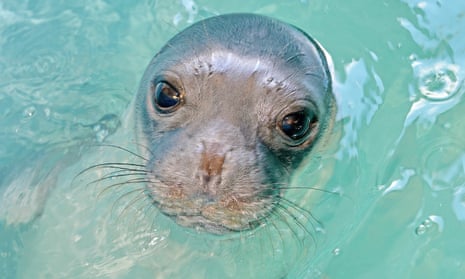A reward has been announced by a Greek environmental group intent on finding “all those responsible” for the brutal death of a celebrated monk seal discovered harpooned in waters off the island of Alonissos.
MOm, the Hellenic Society for the Study and Protection of the Monk Seal, said it was offering a €18k (£15k) bounty for information, or evidence, that “will lead to the arrest of the person(s) responsible for the killing of the seal, known as Kostis”.
“We hope this will provide the extra push to find who did it,” said the group’s coordinator, Dimitris Tsiakalos. “And at the very least if that doesn’t happen, help ensure that it never happens again.”
Fewer than 750 Mediterranean monk seals remain, making them among the world’s most endangered species. The vast majority inhabit Greek waters, with most located in a marine park near Alonissos in the Northern Sporades. What is left of the population elsewhere can be found mostly off the Atlantic coast of Mauritania in north-west Africa.
Named after the fisher who found him washed up on a Cycladic island beach when a hurricane-like storm battered the country in 2018, Kostis was discovered floating off Alonissos last weekend, “executed at close range with a spear gun”, according to the group.
The news elicited outrage, with local people and conservationists demanding the culprit be found.
Barely three years old, Kostis was adopted by the island as a mascot. The creature could often be seen clambering on to boats moored in Alonissos’s port and posing for photographs. “He’d play with swimmers. He was very friendly, perhaps overly friendly,” Tsiakalos said. “He’d let people hug him and pet him.”
It was the first time, he said, that the non-profit group, which works exclusively to protect the monk seal, had ever offered a reward.
“We hope that the culprit is found, because this is a criminal act,” Panagiotis Dendrinos, who heads the organisation, said earlier. “It is not only an immoral act, it is also illegal.”
On Tuesday, a public prosecutor ordered an investigation into the seal’s death, instructing the local coastguard to begin taking testimony from witnesses. Conservationists believe Kostis was almost certainly killed deliberately, citing the size of the harpoon – which was more than a metre in length – and the direction from which it was fired as proof that his death was unlikely to have been an accident.
“Everything points to this being done on purpose,” said Dendrinos. “The way the animal was hit, the weapon used. It has greatly saddened and enraged us, and not only us, but also the majority of residents and visitors of Alonissos island, who knew Kostis, this seal that hung around the port.”
Although adored by many local people and visitors, the marine mammals are often regarded as a menace by fishers who regularly complain of seals destroying their nets to feast on the catch of the day.
